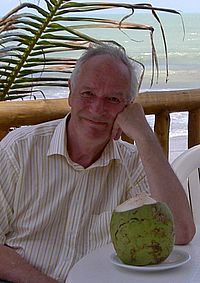You are here: vision-research.eu » People » Emeriti » van Veen, Theo
Theo van Veen
| 1975-1981 | PhD studies at Lund University |
|---|---|
| 1981 | PhD exam at Lund University |
| 1991 | Professor and chairman of dept of animal morphology at Göteborg University |
| 1994-1999 | Prefekt (director) of the Institute of Zoology (3 departments) |
| 2000 | Guest Professor of exp. Ophthalmology at Lund University |
| 2004 | Full professor of exp. Ophthalmology |
| 2007 - | Senior Consultant and group leader at the division of Experimental Ophthalmology Tübingen University |
Documents
CV of Theo van Veen [pdf]
Scientific Interests
- To investigate, and interfere with, the signals of degenerating photoreceptors that lead to death or survival.
- To improve neuroprotection through new combinations / concentrations of known and novel rescue factors.
- To investigate the role of glia cell activation in the process of photoreceptor cell death and survival
Further Activities
- CEO for two small companies
Methodology
- Histopathology
- Long term retinal organ cultures
- Immunohistochemistry
- Histochemistry
- Western blot
- Q-PCR
- Micro Array
Memberships
- Association for Research in Vision and Ophthalmology (ARVO)
- ICER
- Neuroscience
 |
Contact
University of Tübingen
Centre for Ophthalmology
Institute for Ophthalmic Research
Roentgenweg 11
72076 Tuebingen
German
Phone: +49-7071-29-84020
Fax: +49-7071-29-5777
Publications
- van Veen T, Östholm T, Gierschik P, Spiegel A, Somers B, Klein DC .
α-Transducin immunoreactivity in retinae and sensory pineal organs of adult vertebrates.
Proc Natl Acad Sci USA 83: 912-916, 1986
- Szél A, van Veen T, Röhlich P.
Retinal cone differentiation.
Nature 370: 336, 1994
- Röhlich P, van Veen T, Szél A
Two different visual pigments in one retinal cone cell.
Neuron 13: 1159-1166, 1994
- Caffe AR, Söderpalm AK, Holmqvist I, van Veen T
A combination of CNTF and BDNF rescues rd photoreceptors but changes rod differentiation in the presence of RPE in retinal explants.
Invest. Ophthalmol. Vis. Science 42(1):275-82, 2001
- Hauck SM, Ekström PA, Ahuja-Jensen P, Suppmann S, Paquet-Durand F, van Veen T, Ueffing M.
Differential modification of phosducin protein in degenerating rd1 retina is associated with constitutively active Ca2+/calmodulin kinase II in rod outer segments.
Mol Cell Proteomics. 2006 Feb;5(2):324-36.
- Ahuja P, Caffé AR, Ahuja S, Ekström P, van Veen T.
Decreased glutathione transferase levels in rd1/rd1 mouse retina: replenishment protects photoreceptors in retinal explants.
Neuroscience. 2005;131(4):935-43.
- Azadi S, Johnson LE, Paquet-Durand F, Perez MT, Zhang Y, Ekström PA, van Veen T.
CNTF+BDNF treatment and neuroprotective pathways in the rd1 mouse retina.
Brain Res. 2007 Jan 19;1129(1):116-29.
- Sanz MM, Johnson LE, Ahuja S, Ekström PA, Romero J, van Veen T.
Significant photoreceptor rescue by treatment with a combination of antioxidants in an animal model for retinal degeneration.
Neuroscience. 2007 Mar 30;145(3):1120-9
- Paquet-Durand F, Silva J, Talukdar T, Johnson LE, Azadi S, van Veen T, Ueffing M, Hauck SM, Ekström PA.
Excessive activation of poly(ADP-ribose) polymerase contributes to inherited photoreceptor degeneration in the retinal degeneration 1 mouse.
J Neurosci. 2007 Sep 19;27(38):10311-9.
- Ahuja S, Ahuja-Jensen P, Johnson LE, Caffé AR, Abrahamson M, Ekström PA, van Veen T
rd1 Mouse retina shows an imbalance in the activity of cysteine protease cathepsins and their endogenous inhibitor cystatin C.
Invest Ophthalmol Vis Sci. 2008 Mar;49(3):1089-96.


